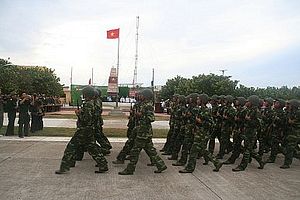Last week, a high-ranking Vietnamese delegation paid a visit to Brussels. The scheduled trip highlighted ongoing attempts by both sides to continue collaboration in the security realm despite the lingering challenges in advancing ties on this front.
As I have observed before in these pages, while Vietnam has long had ties with select European states, ties between Hanoi and the European Union as a bloc have gotten greater traction over the past few years, with a Partnership and Cooperation Agreement signed in 2012 and taking effect in 2016 laying the framework for the relationship.
As this has occurred, there has been a focus on opportunities in the security realm as well despite lingering challenges including those related to Vietnam’s human rights record. Security collaboration has proceeded in areas such as the EU’s provision of expertise, equipment, and funding in areas like peacekeeping, and there has been talk about other advances as well including Vietnam becoming an EU official partner on defense cooperation through the inking of a Joint Vision Statement on Defense and a memorandum of understanding on bilateral defense cooperation between the two sides.
That has continued on over the past year or so. Indeed, just last month, the visit of Deputy Secretary General of the European External Action Service Jean-Christophe Belliard to Vietnam saw both sides discuss some issues in the security realm, with notable points of discussion by both sides including more visits by naval ships of EU countries to Vietnam, assistance in the training of interpreters for Hanoi during its holding of the ASEAN chairmanship in 2020, and Vietnam’s attendance at the meeting of the EU defense chiefs scheduled for May in Brussels, following Vietnam’s inaugural participation in the European Union Military Committee meeting last year.
This week, this aspect of ties was in the headlines again with the aforementioned scheduled visit of a high-ranking Vietnamese delegation to Brussels. The delegation, led by Deputy Defense Minister Nguyen Chi Vinh, was on a trip from May 19-22 that was tied to the meeting of the EU Chief of Defense at the invitation of the Chairman of the EU Military Committee Claudio Graziano.
Per the official account of the visit by Vietnam’s defense ministry, the Vietnamese defense delegation participated in discussions at the meeting on various aspects, including non-combat training missions and Single European Sky – an ongoing effort within Europe to better manage the region’s air traffic management system – as well as shared Vietnam’s experiences on various subjects including peacekeeping.
The visit was also an opportunity for both sides to discuss the current status and future evolution of the Vietnam-EU defense relationship as well as broader developments of mutual interest. During the trip, the Vietnamese delegation held a working session with Graziano, where they discussed aspects of this, prospects for further collaboration in areas such as peacekeeping and foreign language training, and Vietnam’s candidacy for a non-permanent seat at the UN Security Council.
Both sides also addressed the issue of how to further develop institutionalized cooperation in the defense realm, amid ongoing challenges as well as specifics that remain to be worked out. The discussions centered on familiar agenda items that have been discussed previously in this regard, including a framework participation agreement to formalize Vietnam’s participation in crisis management activities of the EU and a memorandum of understanding on EU-Vietnam defense relations.
To be sure, this visit was just the latest between the two sides, and is only part of ongoing efforts to develop the defense aspect of the relationship. Nonetheless, it did reinforce both sides’ commitment to trying to advance security collaboration in spite of the challenges that remain and amid the other ongoing developments in their domestic and wider foreign policies.

































